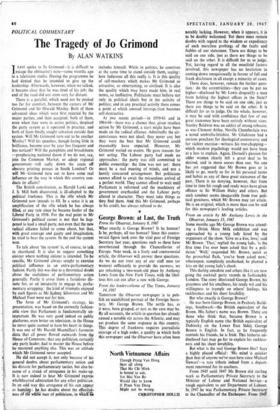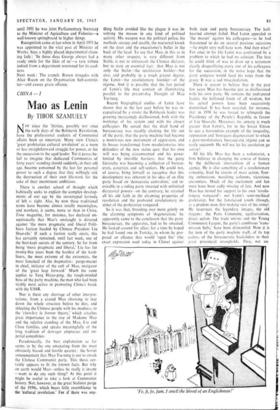The Tragedy of Jo Grimond
POLITICAL COMMENTARY
By ALAN WATKINS
T LAST spoke to Jo Grimond—it is difficult to 'escape the obituarist's note—some months ago in a television studio. During the programme he had denied that he intended to give up the leadership. Afterwards, however, when we talked, it became clear that he was tired of his job; the end of the road did not seem very far distant.
There is a parallel, which need not be pushed too far for comfort, between the careers of Mr Grimond and Sir Oswald Mosley. Both of them advanced ideas which were first rejected by the major parties, and then accepted; both of them, even when they were in active politics, despised the party system as it operated in practice; and both of them finally sought salvation outside that system. Will Mr Grimond turn out to be another Mosley? Will his speeches, though losing little in brilliance, become year by year less frequent and less noticed? Will the pamphlets and broadsheets —prophesying national doom if we do not, say, join the Common Market, or adopt regional government—roll sadly down the years off obscure printing presses in South London? Or will Mr Grimond turn out to have some real influence on the way in which this country con- ducts its affairs?
The British constitution, as Harold Laski and J. $. Mill both discovered, is ill-adapted to the political freelance. This is the r8le which Mr Grimond now intends to fill. In a sense it is an amplification of the role which he has always filled, at any rate since he became leader of the Liberal Party in 1956. For the real point to Mr Grimond's political career is not that he hap- pened to lead a small party, not even that the new radical alliance failed to come about, but that, with great courage and gaiety and imagination, he tried to beat the system. In the end the system won.
To talk about 'the system' is, of course, to talk in shorthand. It is also to suggest something sinister where nothing sinister is intended. To be specific, Mr Grimond always sought to exercise political influence in an extra-parliamentary fashion. Partly this was due to a theoretical doubt about the usefulness of parliamentary action generally. Partly it arose from a fastidious dis- taste for, or an incapacity to engage in, parlia- mentary scrapping : the kind of triumphs enjoyed by such figures as Mr Sydney Silverman and Mr Michael Foot were not for him.
The form of Mr Grimond's strategy, his presentation, was based on the currently fashion- able view that Parliament is fundamentally un- important. He was very good indeed on public platforms, even better on television; in the House he never quite seemed to have his heart in things. It was one of Mr Harold Macmillan's favourite dicta that all power flowed outwards from th House of Commons; that any politician, certainly any party leader, had to master the House befOre he mastered anything else. This was an attitude which Mr Grimond never accepted.
He did not accept it, not only because of his general doubts about parliamentary action and his distaste for parliamentary tactics, but also be- cause of a streak of arrogance in his make-up. It is rare indeed to hear Mr Grimond express wholehearted admiration for any other politician. In an odd way this arrogance of his can appear as humility : he has doubts about the effective- ness olthe wli6le.race of politicians, in Whicli
includes himself. While in politics, he contrives at the same time to stand outside them, saying: how ludicrous all this really is. It is this quality of self-mockery which makes Mr Grimond so attractive, so entertaining, so civilised. It is also the quality which may have made him, in real terms, so ineffective. Politicians must believe not only in political ideals but in the activity of politics; and in any practical activity there comes a point at which amused introsptction becomes self-destructive.
At two recent periods—in 1959-61 and in 1964-66--there was a chance that, given resolute action by Mr Grimond, a start might have been made on the radical alliance. Admittedly the cir- cumstances were not ideal; they never are; but they were the best that Mr Grimond could reasonably have expected. However, Mr Grimond waited on events. He gave reasons for not acting. The Labour party had made no approaches: the party was still committed to public ownership : the time was not yet: there must be a real meeting of minds, and not a hastily concocted arrangement. But politicians cannot afford to await the miraculous arrival of a perfect world. They cannot afford to wait until Parliament is reformed and the machinery of government overhauled and the Labour party altered in character. They must take things as they find them. And this Mr Grimond, perhaps to his credit, has always refused to do.
George Brown: at Last, the Truth From the Observer, January 8, 1967
What exactly is George Brown? Is he human? Is he, perhaps, all too human? Since this contro- versial figure took over the vital post of Foreign Secretary last year, questions such as these have reverberated through the Chancellories of Europe. Next week, in a lively and controversial article, the Observer will answer these questions. As we do not trust any of our staff men (or women) sufficiently to provide the answers, we are rehashing a two-week-old piece by Anthony Lewis from the New York Times, with the libel- lous bits cut out after a row with George.
From the leader-column of The Times, January 14, 1967 Tomorrow the Observer newspaper is to pub- lish an uninhibited portrait of the Foreign Secre- tary, Mr George Brown. The nettle has, as it were, been grasped, or not, as the case may be. By all accounts, the article in question has already caused a notable stir across the Atlantic, and may yet produce the same response in this country. This degree of frankness requires journalistic courage of a high order, a quality is which both this newspaper and the Observer have often been notably lacking. However, when it appears, it is to be doubly welcomed. Yet there must remain doubts with regard to the wisdom or expediency of such merciless probings of the faults and foibles of our statesmen. There are things to be said on one side, just as there are things to be said on the other. It is difficult for us to judge. Yet, having regard to all the manifold factors involved, this newspaper has no hesitation in coming down unequivocally in favour of full and frank disclosure in all except a minority of cases.
There does, however, remain the further ques- tion : do the eccentricities—they can be put no higher- disclosed by Mr Lewis disqualify a man from holding the highest offices in the State? There are things to be said on one side, just as there are things to be said on the other. It is difficult for us to judge. On the whole, however, it may be said with confidence that few of our great statesmen have been entirely without vices. Stanley Baldwin was an addict of strong tobacco, as was Clement Attlee. Neville Chamberlain was a noted umbrella-fetishist. Mr Gladstone had a curious penchant for theological controversy and for violent exercise—witness his tree-chopping- which modern psychology would not have been at a loss to explain. Again, Disraeli's passion for older women clearly left a great deal to be desired, and in more senses than one. No one has yet suggested that Mr Brown goes or is likely to go, nearly so far in his personal tastes and habits as any of these great statesmen of the past. There is no denying, however, that from time to time his rough and ready ways have given offence to Sir William Haley and others. But such conduct seems inseparable from true poli- tical greatness, which Mr Brown may yet attain. He, is an original, which is more than can be said for this newspaper's leading articles.
From an article by Mr Anthony Lewis in the Observer, January 15, 1967 Some months ago Mr George Brown was attend- ing a Drink More Milk exhibition and was approached by a young lady hired by the organisers of the show. 'Give us a kiss, love,' said Mr Brown. 'That,' replied the young lady, 'is the first time I've ever been asked that by a poli- tician.' Well,' responded Mr. Brown, quick as the proverbial flash, 'you've been asked now,' whereupon, completely unabashed; he planted a kiss on the young lady's cheek.
This daring anecdote and others like it are now going the cocktail party rounds in fashionable London. The story illustrated George Brown, his greatness and his smallness, his ready wit and his willingness to trample on others' feelings, his recklessness and his sheer lovability.
But who exactly is George Brown?
-- He was born George Brown, in Peabody Build- ings, Southwark—the British equivalent of the Bronx. His father's name was Brown. There are those who think that, because Brown is a typically English name (the British equivalent of Dubinsky on the Lower East Side), George Brown is English. In fact, as he frequently reminds his friends, he is Irish. This hitherto un- disclosed fact may go far to explain his reckless- ness and his sheer lovability.
But what is the real George Brown like? Says a highly placed official: 'His mind is quicker glen that of anyone we've seen here since Michael Stewart'—a rare tribute indeed from a depart- ment renowned for its coolness.
From 1945 until 1947 Mr Brown did sterling work as Parliamentary Private Secretary to the Minister of Labour and National Service—a rough equivalent to our Department of Labour. In 1947 he was Parliamentary Private Secretary to the Chancellor of the Exchequer. From 1947
until 1951 he was joint Parliamentary Secretary to the Minister of Agriculture and Fisheries—a well-known springboard to higher things.
Recognition came at last when in April 1951 he was appointed to the vital post of Minister of Works. Says a highly placed departmental clean- ing lady: 'In those days George always had a ready smile for the likes of us'—a rare tribute indeed from a department renowned for its cool- ness.
Next week : The crunch. Brown struggles with Alice Bacon on the Organisation Sub-commit- tee—and causes grave offence.



































 Previous page
Previous page